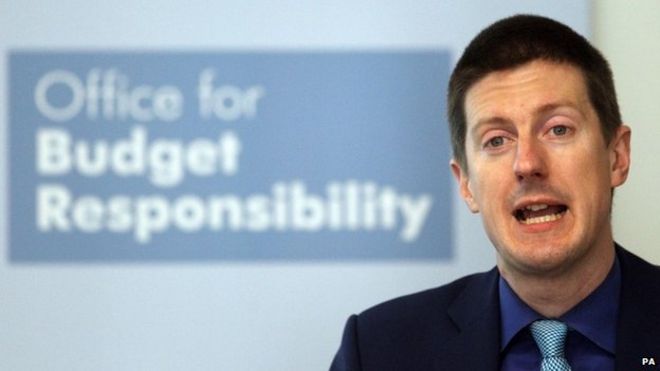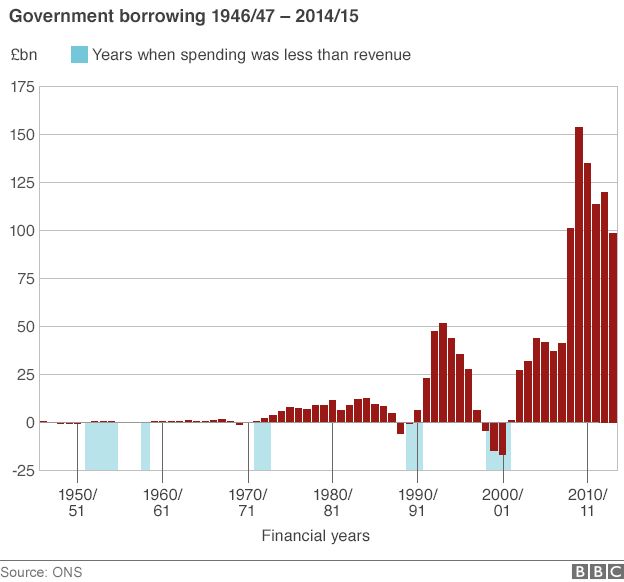Further cuts in government spending will be needed beyond this parliament in order to bring the national debt under control, the Office for Budget Responsibility (OBR) has warned.

In its annual report, the OBR said that without further spending cuts or tax rises, the national debt would only increase.
It said a permanent £20bn cut in annual public spending will be needed by 2020.
That would help bring the national debt down to 40% of GDP by 2064, it said.
If achieved, this means it would have taken more than half a century to bring the national debt back to the same level it was before the 2008 financial crisis.
Last year, public sector net debt was £1.48tn, or 80% of economic output, compared with around £600bn, or around 42% of GDP, in 2008.
And the OBR warned that even a cut of this size, equivalent to 1.1% of GDP, would not be sufficient to keep the national debt at 40% beyond 2064.
A Treasury spokesperson responded: "Our deficit is less than half what it was, but [today's] report from the OBR clearly shows the hard work that needs to be done to fix the public finances and deliver economic security and prosperity for working people."

The forecast spending cuts come a day after the Chancellor George Osborneannounced plans to bind future governments to operating a budget surplus during times of economic growth.
But the OBR cast doubt on the government's ability to maintain a surplus, forecasting the UK public sector borrowing would still be necessary by the mid 2030s as a result of the demands of an ageing population.
OBR chairman Robert Chote said the government needed to define what it meant by normal times, and that it might not be easy to calculate.
"No-one can know with confidence how much spare capacity there is in the economy or what the sustainable growth rate ... will be looking forward," he said. "Any rule needs to be defined in the knowledge that our estimates of these things may change."
The OBR said the government's triple-lock on the state pension - whereby the state pension rises by whichever is the greater of inflation, average earnings, or 2.5% - had resulted in an additional £2.9bn cost to the government, seven times higher than the £0.4bn increase originally forecast in 2010.
Earlier this week, ratings agency Moody's warned that the government will find it very difficult to achieve a budget surplus by 2018-19, and is still likely to be operating a deficit of between 1% and 2% of GDP by 2020.
Further cuts
The chancellor is due to announce spending cuts to welfare and government departments totalling £30bn over two years in his summer Budget next month.
The OBR warned if the government only made the cuts it has currently outlined, the national debt as a share of GDP would fall to 50% by the mid-2030s.
But it forecast debt to be 87% of GDP by the 2060s as a result of an ageing population, declining revenues from North Sea oil and gas, and the impact of student loans.
While admitting they were difficult to predict, the OBR forecast North Sea oil and gas revenues would fall to below 0.1% of GDP over the coming decades. It said the tax take from North Sea oil and gas had already fallen by 80% in the last three years.
That would mean a decline in revenues to £2bn in total between 2020 and 2040, down from last year's forecast of £37bn for the period.
The OBR said its latest forecast recognised the obvious collapse in oil prices in the past year but also the effect of lower production since last year.
Accumulated losses and future decommissioning costs would also impact future revenues, it said.
"Our analysis of longer-term pressures on revenue streams suggests that governments will, over time, need to find new sources of revenue to maintain the overall ratio of revenue to national income, let alone to meet the spending pressures from an ageing population," the OBR said.
No comments:
Post a Comment